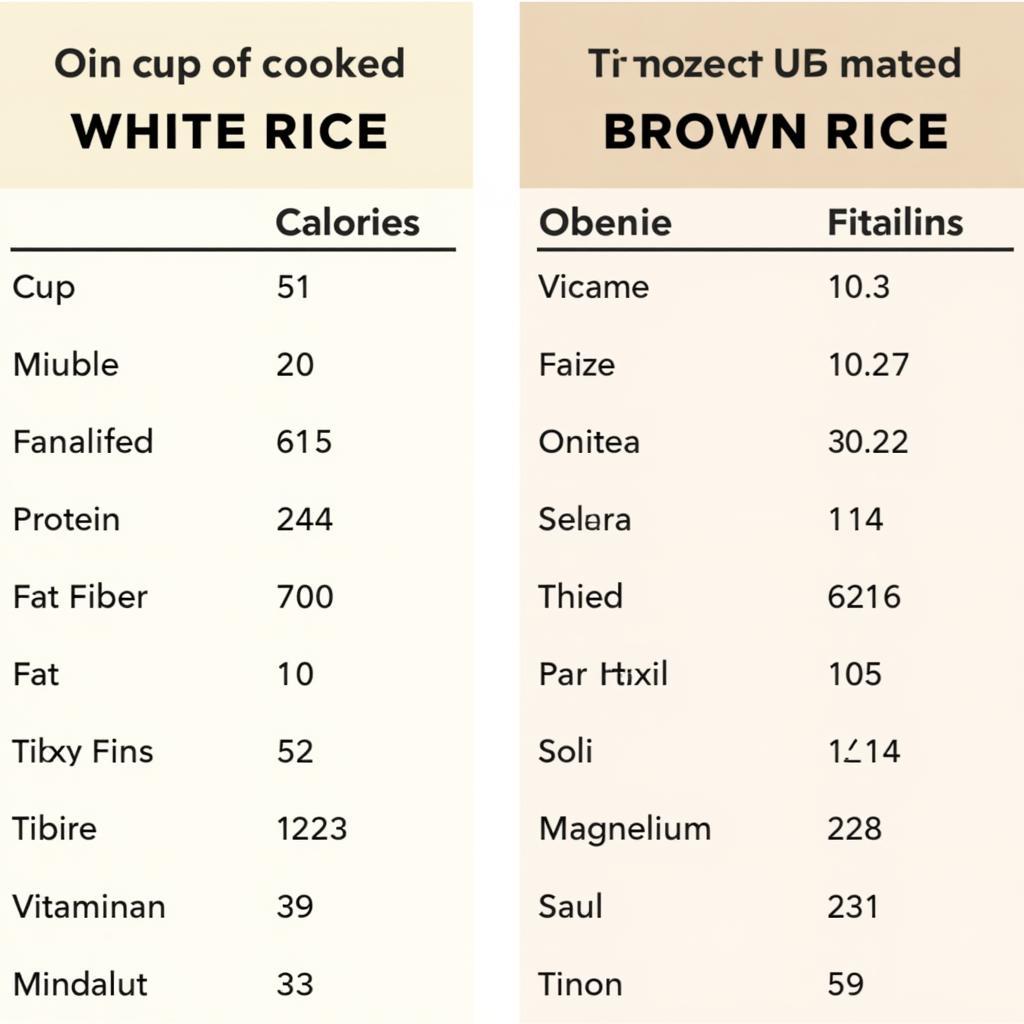1 cup of rice is a common staple in many diets around the world. But how nutritious is it, really? This article delves into the 1 cup of rice nutrition facts, exploring its calorie content, macronutrient breakdown, vitamin and mineral composition, and its impact on health.
Decoding the 1 Cup of Rice Nutrition Label
Understanding the nutritional value of 1 cup of rice can help you make informed dietary choices. Different types of rice have varying nutritional profiles. We’ll primarily focus on white rice and brown rice, the two most common varieties.
Calories and Macronutrients in 1 Cup of Rice
A 1 cup serving of cooked white rice contains approximately 205 calories, while the same serving of brown rice has about 216 calories. This slight difference in calories stems from the bran and germ layers present in brown rice but removed in white rice. These layers contain fiber and other nutrients.
- Carbohydrates: Rice is primarily a source of carbohydrates. One cup of cooked white rice provides around 45 grams of carbs, while brown rice contains about 46 grams.
- Protein: Rice offers a modest amount of protein. A 1 cup serving of white rice contains around 4 grams of protein, and brown rice provides about 5 grams.
- Fat: Rice is relatively low in fat. Both white and brown rice contain less than 1 gram of fat per 1 cup serving.
1 Cup of Rice: Vitamins and Minerals
While often perceived as a simple carbohydrate source, rice contributes to your intake of several essential vitamins and minerals.
Micronutrients in White Rice vs. Brown Rice
Brown rice emerges as the clear winner in terms of micronutrient content. The bran and germ layers contain significant amounts of B vitamins, magnesium, phosphorus, and manganese. White rice, having these layers removed, is lower in these nutrients.
 Nutrition facts table for rice
Nutrition facts table for rice
1 Cup of Cooked Rice: Impact on Blood Sugar
The glycemic index (GI) of rice varies depending on the type. White rice has a higher GI, meaning it can cause a more rapid spike in blood sugar levels compared to brown rice, which has a lower GI due to its fiber content.
Is 1 Cup of Rice Healthy?
Rice can be part of a healthy diet. However, portion control is essential, especially with white rice due to its higher GI.
Incorporating 1 Cup of Rice into a Balanced Diet
Brown rice is generally the healthier choice due to its higher fiber and micronutrient content. Combining rice with lean protein and vegetables can create a balanced and nutritious meal.
Conclusion: Making Informed Choices about 1 Cup of Rice
Understanding the 1 cup of rice nutrition facts empowers you to make informed choices about your diet. By choosing brown rice over white rice and practicing portion control, you can enjoy the benefits of this staple food while minimizing potential negative impacts on blood sugar. Remember to incorporate a variety of foods into your diet for optimal nutrition.
FAQ: 1 Cup of Rice Nutrition Facts
- How many calories are in 1 cup of cooked white rice? Approximately 205 calories.
- Is brown rice healthier than white rice? Generally, yes, due to its higher fiber and micronutrient content.
- What is the glycemic index of rice? It varies depending on the type. White rice has a higher GI than brown rice.
- How much rice should I eat in a day? Recommendations vary, but portion control is key.
- Can I eat rice if I have diabetes? Yes, but choose brown rice and monitor your blood sugar levels.
- What are the benefits of eating brown rice? It provides fiber, vitamins, minerals, and can help regulate blood sugar.
- Is rice gluten-free? Yes, all types of rice are naturally gluten-free.
When you need support, please contact Phone Number: 0372999996, Email: bong.da@gmail.com Or come to the address: 236 Cau Giay, Hanoi. We have a 24/7 customer service team.
